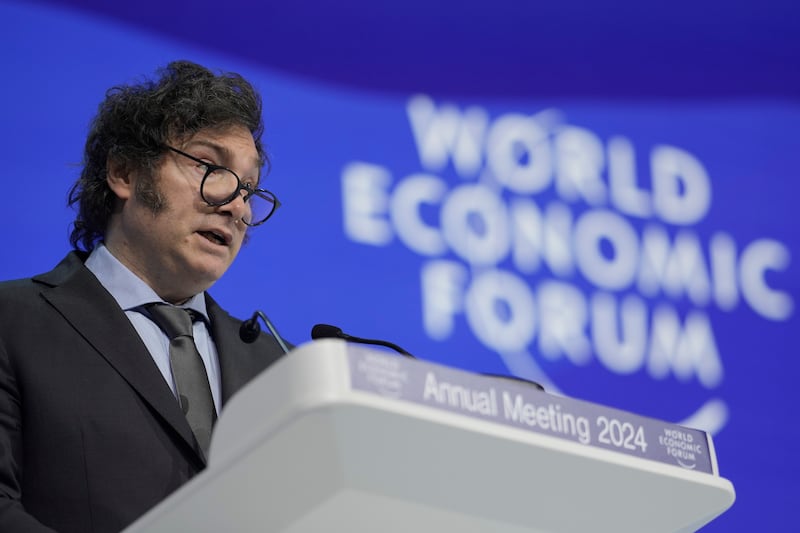Argentina’s recently inaugurated president, Javier Milei, spoke at the World Economic Forum on Wednesday, where he said, “The West is in danger.”
Milei said establishing free markets is the only morally sound way to reduce poverty, and “danger” comes from leaders who are “co-opted by a vision of the world that inexorably leads to socialism and thereby to poverty.”
Milei said progressive ideologies like “radical feminism,” and climate activism lead to poverty. The president also critiqued neoclassical economic theory and claimed market failures do not happen naturally.
In an interview last year with The Economist, Milei said he began studying economics as a 10-year-old when Argentina went into hyperinflation. Since then, he has earned two master’s degrees in economics, published over 50 academic papers, led the economics division of an Argentine think tank and served in Argentina’s Congress, per the Deseret News.
Milei began his speech at the World Economic Forum by talking about the impacts free markets have had on the world from “year zero” to the present.
The impact of free markets on the world
Milei said free markets have lifted societies. He spoke about how economic well-being improved significantly after the introduction of free markets.
Countries operating under free markets “are 12 times richer than those that are repressed,” Milei said, adding, “The lowest percentile in free countries is better off than 90% of the population in repressed countries.”
Argentina adopted a free market system in 1860 and “became a leading world power” in 35 years, he said. But after rising as a world power, Milei said Argentine leaders and citizens “embraced collectivism” in the 1920s, and their global economic rank has dropped significantly since.
Milei said, “No one is in a better place than us, Argentines,” to warn countries of what happens when leaders use “collectivist experiments” to solve societal issues.
Milei said social justice is ‘intrinsically unfair’ and ‘violent’
Milei asked his audience why academia, political entities and economic theorists “demonize an economic system that has not only lifted 90% of the world’s population out of extreme poverty but has continued to do this faster and faster?”
Opposition to capitalism involves claims the system is unfair, promotes inequality and is overly individualistic, he said. On the other hand, people believe “collectivism is good because it’s altruistic toward others.”
Milei challenged this view of collectivism, saying, “It should never be forgotten that socialism is always and everywhere an impoverishing phenomenon that has failed in all countries where it’s been tried out.”
“It’s been a failure economically, socially, culturally, and it also murdered over 100 million human beings,” he said.
Redefining markets
Referencing neoclassical economic theory, Milei said, “The market is not a mere graph describing a curve of supply and demand. The market is a mechanism for social cooperation where you voluntarily exchange ownership rights.”
Milei suggested with this definition, independent market failure is impossible without “coercion.”
Coercion generally comes from the state, “which holds a monopoly on violence,” Milei said. When market failures happen, Milei said people should ask “if there is state intervention involved.”
‘Battle of the sexes’ impeding economic growth
Milei said he believes societal conflicts harm economic growth. He described the first as, the “unnatural fight between man and woman.”
“Another conflict presented by socialists is that of humans against nature,” Milei said. The belief that humans inevitably cause harm to the planet has led groups to advocate “for population control mechanisms or the abortion agenda,” which Milei described as “harmful ideas.”


